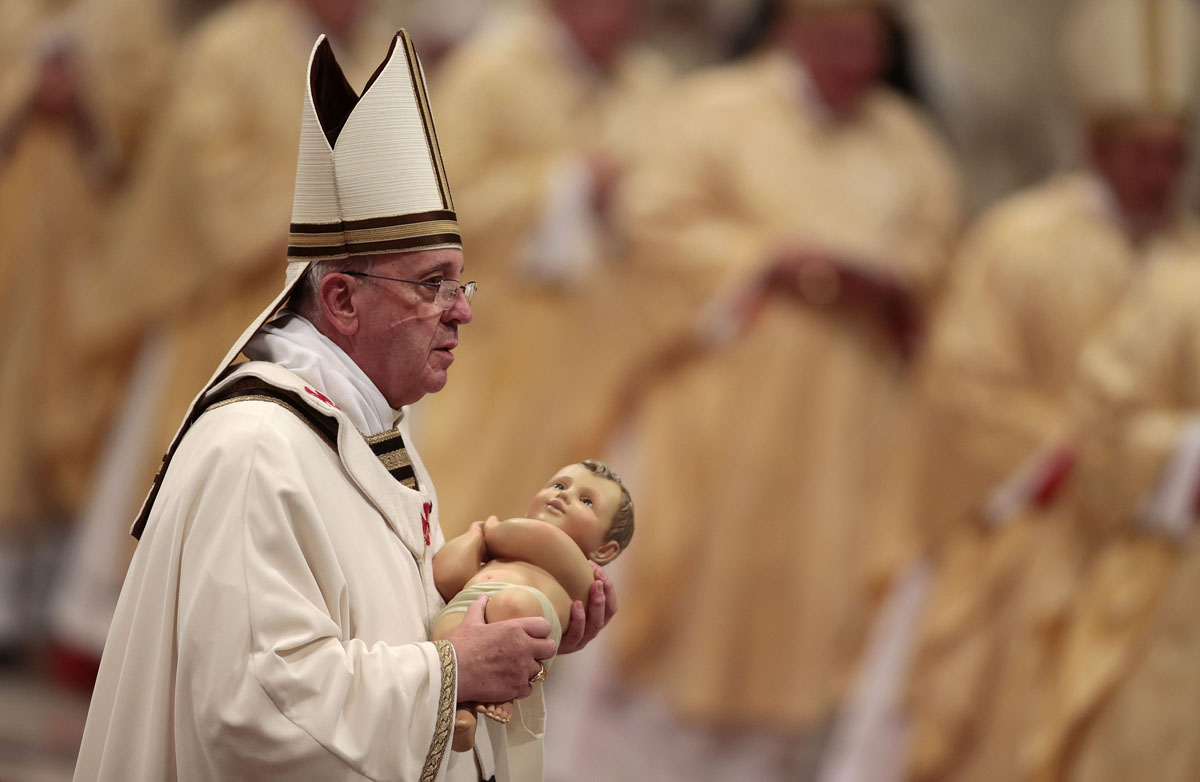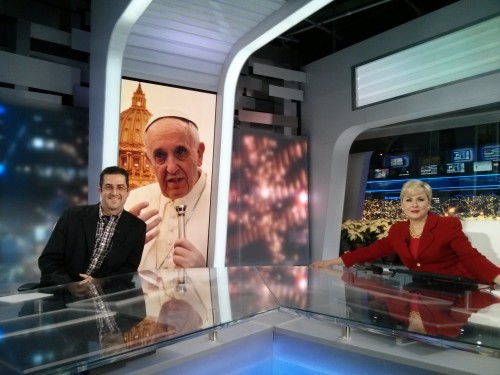
24 DECEMBER 2014
“The people who walked in darkness have seen a great light; those who dwelt in a land of deep darkness, on them has light shined” (Is 9:1). “An angel of the Lord appeared to [the shepherds] and the glory of the Lord shone around them” (Lk 2:9). This is how the liturgy of this holy Christmas night presents to us the birth of the Saviour: as the light which pierces and dispels the deepest darkness. The presence of the Lord in the midst of his people cancels the sorrow of defeat and the misery of slavery, and ushers in joy and happiness.
We too, in this blessed night, have come to the house of God. We have passed through the darkness which envelops the earth, guided by the flame of faith which illuminates our steps, and enlivened by the hope of finding the “great light”. By opening our hearts, we also can contemplate the miracle of that child-sun who, arising from on high, illuminates the horizon.
The origin of the darkness which envelops the world is lost in the night of the ages. Let us think back to that dark moment when the first crime of humanity was committed, when the hand of Cain, blinded by envy, killed his brother Abel (cf. Gen 4:8). As a result, the unfolding of the centuries has been marked by violence, wars, hatred and oppression. But God, who placed a sense of expectation within man made in his image and likeness, was waiting. He waited for so long that perhaps at a certain point it seemed he should have given up. But he could not give up because he could not deny himself (cf. 2 Tim 2:13). Therefore he continued to wait patiently in the face of the corruption of man and peoples.
Through the course of history, the light that shatters the darkness reveals to us that God is Father and that his patient fidelity is stronger than darkness and corruption. This is the message of Christmas night. God does not know outbursts of anger or impatience; he is always there, like the father in the parable of the prodigal son, waiting to catch from afar a glimpse of the lost son as he returns.
Isaiah’s prophecy announces the rising of a great light which breaks through the night. This light is born in Bethlehem and is welcomed by the loving arms of Mary, by the love of Joseph, by the wonder of the shepherds. When the angels announced the birth of the Redeemer to the shepherds, they did so with these words: “This will be a sign for you: you will find a baby wrapped in swaddling clothes and lying in a manger” (Lk 2:12). The “sign” is the humility of God taken to the extreme; it is the love with which, that night, he assumed our frailty, our suffering, our anxieties, our desires and our limitations. The message that everyone was expecting, that everyone was searching for in the depths of their souls, was none other than the tenderness of God: God who looks upon us with eyes full of love, who accepts our poverty, God who is in love with our smallness.
On this holy night, while we contemplate the Infant Jesus just born and placed in the manger, we are invited to reflect. How do we welcome the tenderness of God? Do I allow myself to be taken up by God, to be embraced by him, or do I prevent him from drawing close? “But I am searching for the Lord” – we could respond. Nevertheless, what is most important is not seeking him, but rather allowing him to find me and caress me with tenderness. The question put to us simply by the Infant’s presence is: do I allow God to love me?
More so, do we have the courage to welcome with tenderness the difficulties and problems of those who are near to us, or do we prefer impersonal solutions, perhaps effective but devoid of the warmth of the Gospel? How much the world needs tenderness today!
The Christian response cannot be different from God’s response to our smallness. Life must be met with goodness, with meekness. When we realize that God is in love with our smallness, that he made himself small in order to better encounter us, we cannot help but open our hearts to him, and beseech him: “Lord, help me to be like you, give me the grace of tenderness in the most difficult circumstances of life, give me the grace of closeness in the face of every need, of meekness in every conflict”.
Dear brothers and sisters, on this holy night we contemplate the Nativity scene: there “the people who walked in darkness have seen a great light” (Is 9:1). People who were unassuming, open to receiving the gift of God, were the ones who saw this light. This light was not seen, however, by the arrogant, the proud, by those who made laws according to their own personal measures, who were closed off to others. Let us look to the crib and pray, asking the Blessed Mother: “O Mary, show us Jesus!”.


 CTV News interviewed me about Pope Francis’ Christmas message to the Roman Curia (essentially those Church officials responsible for the internal functioning of key Vatican departments). Since my entire live interview on CTV News Channel with Jennifer Ward was not posted online (a brief, out of context clip appeared on the nightly National News broadcast with Lisa LaFlamme), I’m going to summarize my key points below. There has been a great deal of interest surrounding what the Pontiff said, which many have interpreted as a “stinging rebuke” by the Holy Father, that was “received coldly” by his audience. Is that really the case?
CTV News interviewed me about Pope Francis’ Christmas message to the Roman Curia (essentially those Church officials responsible for the internal functioning of key Vatican departments). Since my entire live interview on CTV News Channel with Jennifer Ward was not posted online (a brief, out of context clip appeared on the nightly National News broadcast with Lisa LaFlamme), I’m going to summarize my key points below. There has been a great deal of interest surrounding what the Pontiff said, which many have interpreted as a “stinging rebuke” by the Holy Father, that was “received coldly” by his audience. Is that really the case? Q. We’ve seen a spate of biblically themed movies in theatres lately: Son of God, Noah (starring Russell Crowe), and now Exodus: Gods and Kings (featuring Christian Bale of Batman fame). Why do you think this is?
Q. We’ve seen a spate of biblically themed movies in theatres lately: Son of God, Noah (starring Russell Crowe), and now Exodus: Gods and Kings (featuring Christian Bale of Batman fame). Why do you think this is? Q. Can you tell us about the significance of this Sunday’s Gospel reading?
Q. Can you tell us about the significance of this Sunday’s Gospel reading?